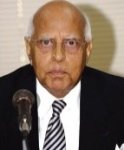Is the US pursuing a Flawed Policy towards Pakistan?
14 Jan, 2008 · 2468
Harun ur Rashid argues that the US ought to pay greater attention to the democratic aspirations of the Pakistani people
In May 1991, while campaigning for another shot at the top political job, the former Prime Minister of India, Rajiv Gandhi, was assassinated by a suicide bomber, and there was an international outpouring of grief. Similarly, in recent weeks, the assassination of the former Prime Minister of Pakistan, Benazir Bhutto, brought forth an expression of anguish and sorrow across the world.
There is a difference between the two events, however. Rajiv Gandhi's death did not rock the political stability of India, while Bhutto's killing has plunged Pakistan into unprecedented political chaos and instability. The reasons for the difference are simple - while one country practices democracy, the other does not.
The death of Benazir Bhutto ruins the diplomatic effort made by the Bush administration over the past year to put in place a power-sharing arrangement between President Musharraf and Benazir Bhutto, but it also reveals the ill-conceived US policy towards Pakistan
President Musharraf became dictatorial over the years with the support of the US and in his greed for power is quite unbelievable. He had to dismiss the Chief Justice and about 40 judges of the higher courts on 3 November under the guise of his emergency, only to retain his power.
President Musharraf's political lifeline depends, not on events in Pakistan, but on what happens in Afghanistan where the US-led "war on terror" has been continuing since 2001. The greater the trouble that occurs in Afghanistan, the more American support increases for Musharraf. This is a reality that President Musharraf understands perfectly. He has seen how the Americans ignored Pakistan after the Soviet soldiers had left Afghanistan in 1989.
Â
After Musharraf aligned with the Americans in its war on terrorism, Pakistan has received more than US$10 billion dollars from the US. The New York Times recently reported that the Pakistan military has diverted half of this assistance for use against India. Pakistan has learnt from experience that the US does not monitor its assistance.
Bhutto's advice after 9/11 to the US was straightforward, but it was not heeded. "Islamabad," she said, "is the jugular vein of Kabul. Clean up Islamabad and the Afghan (al Qaeda) camps start falling like dominoes." Instead, the US looked to Pervez Musharraf and accepted at face value his guarantees that he would crack down on extremism. After eight years of Musharraf's rule, terrorism has only increased in Pakistan.
The Bush administration continued to ignore other political players in Pakistan in their attempts to restore stability and democratic rule in the country until last year. Nawaz Sharif, a former Prime Minister, fell foul of the US administration because he was perceived to be an Islamist. It conveniently forgot that in 1999, Sharif had cooperated with the US in defusing tensions in Kashmir to mitigate what is known as the "Kargil war." This infuriated the army in Pakistan and the result, according to many South Asian analysts, was the coup in October 1999 by Musharraf.
The Bush administration appears to have disregarded the fact that there is a substantial moderating middle class that is an important force for progress and can be the backbone of democracy in Pakistan and that they have been agitating against Musharraf's dictatorial rule for long. The anti-Musharraf movement is not only courageous but also signals to the US that Musharraf is deeply unpopular in Pakistan and the US should not back him. By backing the general, however, the US has also become unpopular with the middle class and civil society in Pakistan. The US has completely failed to sense that public opinion has moved decisively against Musharraf
The US has failed to realize, too, that Pakistan under Musharraf has a political void and is at the same time the emerging centre of Islamist fundamentalism globally. Some US analysts believe that the centre of gravity of Islamist fundamentalism is shifting from the Arab world to Pakistan.
In a report on Bhutto's assassination, the Brussels-based International Crisis Group, a research think-tank, called upon the Bush administration to recognize Musharraf as "serious liability, seen as complicit in the death of popular politician" Bhutto.
Pakistan has become a dangerous and violent country under President Musharraf's rule. A deficit in genuine democracy is the root of all political problems in Pakistan and a resurgent economy cannot replace the urge for freedom and liberty in human beings. US President Woodrow Wilson once said, "The world must be made safe for democracy. Its peace must be planted upon the tested foundations of political liberty." These words hold true for Pakistan today.


